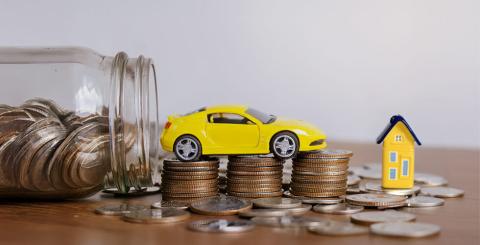If I lend my friend my car, are they insured?

One of the most common questions about car insurance concerns letting a friend or family member borrow one’s car. We’ve all been there—handed the keys to someone we trust to run an errand for us or drive us home from a particularly festive dinner party.
What happens if someone who isn’t you damages your vehicle along the way? Does their car insurance pick up the tab or does yours? Here’s a little explainer.
Make sure everyone knows
The first thing to know is that your car insurance policy covers your vehicle and whoever’s driving it.* If as a one-off you lend your car to a friend or family member and they get in an accident, it’s your insurance that covers the damages, assuming the damage is covered.
But before you go lending your car to someone, it’s important to understand your insurance coverage, its limits and exclusions, and to explain it all to the person taking the wheel. Of course, you’ll also need to make sure your friend has a valid driver’s licence and is fit to drive. Tell them what your deductible is and agree on who’ll pay it if there’s an accident.
Once they’re on the road, your friend will have the same coverage you would. If you’ve only got basic coverage (third-party liability only), your car insurance won’t cover damage to your vehicle if your friend is at fault.
That means if another driver backs into your car when your friend’s at the mall, third-party liability coverage is all you need: any damage will be covered as long as your friend isn’t at fault for the accident. We should also mention that this only works if you can identify the person who is at fault for the accident. Third-party liability doesn’t cover a hit-and-run.
If your friend loses control of the vehicle and crashes it in a ditch, on the other hand, they’re responsible for the accident. If you have vehicle damage (collision) insurance, the repairs are likely to be covered.**
That’s why it’s important to share the relevant information about your insurance coverage with your friend—before they drive away in your vehicle. It can also be a good idea to familiarize yourself with the most common car repairs . That way you’ll know what they’re likely to cost you in the event of an accident.
The same rules apply when you borrow someone else’s vehicle.
It’s all the same when the shoe’s on the other foot—when you’re the one borrowing a friend or family member’s vehicle. So before you take the keys, find out about their car insurance policy and agree on who’ll pay the deductible. If you find out that the vehicle isn’t even insured for third-party liability, let alone vehicle damage, say no thanks!
Driving an uninsured or improperly insured vehicle won’t just cost you money if you have an accident, it can lead to serious headaches with the police. As you know, all vehicles operating on Québec roads are legally required to have third-party liability insurance coverage.
Your insurance goes where you go
It’s also important to remember that even if you weren’t the one who had the accident, your premium could still go up. After all, your car insurance is in your name and covers your vehicle. So you’re on the hook, even when your friend is the one in the car.
Which again is why it’s so important to make sure anyone borrowing your vehicle knows everything they need to know and that you agree on what will happen in the event of an accident. Get the discussion about the deductible out of the way and make sure you know how an accident might affect your insurance file and your premium. As for the FCSA (Fichier central des sinistres automobiles), according to the GAA website, accidents go only on the driver’s claims history.
In a nutshell, before you let a friend or family member borrow your vehicle on a one-time basis or borrow someone else’s vehicle, here’s what to do:
- Look at the insurance on the vehicle you’re lending or borrowing, including the limits and exclusions.
- Make sure whoever’s driving has a valid driver’s licence and is fit to drive.
- Make sure that, if there’s an accident, everyone knows what the deductible is and agrees on who will pay it.
- Be aware that if you let someone borrow your vehicle and they have an accident, your car insurance premiums can go up. It’s the owner’s responsibility to properly insure their vehicle and know what that policy entails.
Get these simple things right, and you and your friends can save yourselves a lot of unnecessary stress and worry. Drive safe!
*Some restrictions and exclusions apply.
** Subject to the coverage, conditions, limits, and exclusions of your car insurance policy.



